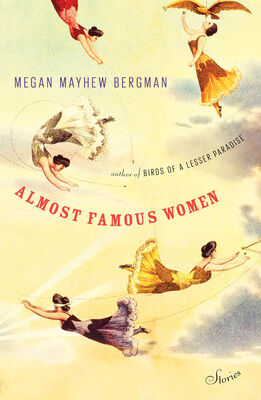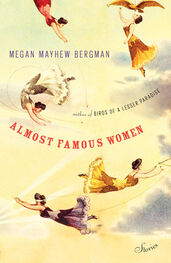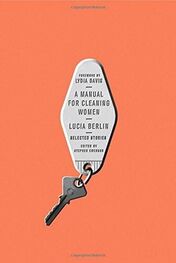“You’re not taking care of yourself,” I said, raising my voice. “You’re crossing the line.”
She groaned and went facedown into her pillow. “Tomorrow,” she mumbled, “I’m going to cheer up London’s children. The ones hiding in the country.”
“You’re all talk,” I said. “You might have done that when you were younger, but not now. You’re wasting your life. You’re lazy and troubled and I can’t stand it! You have failed yourself!”
“Shut up,” she said. “Shut up, shut up, shut up. Tais-toi! ”
Then she tried to get out of bed, as if she was coming after me, but she collapsed to the floor, first onto her knees and then she was passed out again, sprawled like a corpse.
I dragged her to the bathtub; she was unaware, unhelpful, dead weight. She woke up naked in the cold water and reached out to slap my face.
I slapped her back and it felt good, too good. And then she laughed.
Dolly sang:
The tiny fish enjoy themselves
in the sea.
Quick little splinters of life,
their little lives are fun to them
in the sea!
“D. H. Lawrence, darling!” she said, cocking her head back. Don’t you love it? Don’t you remember?”
She splashed my face, and I sat fuming. I left her there and began cleaning up bottles, wiping down the bathroom — there was blood.
“Goddamnit, Dolly,” I said.
“I need to sleep this off,” she interrupted, clumsily reaching for the paraldehyde on the bathroom counter.
“You’ve already had enough!” She got it down before I could reach her.
— Jesus Christ!
And then I let it happen. Because it was the merciful thing to do. I couldn’t take it, seeing beautiful Dolly reduced to this.
Killing her was easy; she wanted me to do it. Woman to woman. I’m not even sure she knew who I was, but she offered me her arm and then her thigh. There were needles on the counter.
“More,” she said. “More!”
All around me, killers. My brother. My neighbor. My countrymen. My enemies.
Everyone has a saturation point.
Everyone is capable of radical change. This is what the war has taught me: we kill each other and we kill ourselves. Even though we sleep in nice hotels on soft French linens. Even though we have dresses we never wear. Even though we drink champagne while others work in coal mines or the trenches of Vimy Ridge, smelling of gangrene. We have always been this way, killers inside. It is the human condition.
The world folds in on itself in a ball of fire, and today I walk down Sloane Street, past the small flat near Belgrave Square, the ugly one with the good address. It is part of my wartime routine, how I assure myself I am an ordinary person, and still alive.
And what of it?

Beryl Markham, 1936.
Photo reprinted from the Bibliothèque nationale de France.
A HIGH-GRADE BITCH SITS DOWN FOR LUNCH
KENYA, 1925
But this girl, who is to my knowledge very unpleasant and we might even say a high-grade bitch, can write rings around all of us.
— Ernest Hemingway, on Beryl Markham
The sun was setting over Lake Nakuru, peering through lavender clouds to leave a golden trail across the water.
Beryl leaned against the brick wall of the stable to watch the lake. The horses were munching their hay, and later she’d groom the filly. Or maybe she’d ride the stallion out for the first time, the one she’d gotten for nothing at auction a few weeks ago, the one with the perfect bloodline. The one who’d killed a man with his hooves and teeth in the corner of a stall in Nairobi. If the filly was her favorite, the stallion was her hope.
She ignored his name because she would give him a new one. She’d give him a new life. He would be reborn into glory on the track, and the customers would line up at her door.
Why don’t you ride him already? she chided herself. You know you can do it. You’ll have to do it if you want to make your money back, and God knows you need money.
Her servant and friend Kibii, whom she’d known all her life, told a client yesterday, “Memsahib is fearless. She’s been riding racehorses since she was eleven.” True, she’d been raised in Nairobi by a father who raced Thoroughbreds, managed a troubled farm, and forgot her birthday. True, a horse had picked her up in his mouth when she was seven and thrown her; she still had the purple scar on her neck.
She could throw a spear like the Nandi. She could hunt. She rode a half-broken motorcycle over the vacant, muddy road from Nakuru to Nairobi when she got lonely, after dark, when you could hear the lions. Once, when she had to pee, an elephant rose from the dark brush and startled her; she ran back to the motorcycle with her wet pants not entirely up.
“You didn’t stand down the elephant?” Kibii asked when she told him, feigning disbelief.
“I’m brave,” she said. “Not an imbecile.”
She poured herself a glass of wine, measuring it because the bottle had to last a week. A week without guests.
She went back to leaning against the stable. She sipped the wine and watched enormous, salmon-colored clouds of flamingos drag their overturned heads across the muddy shallows of Nakuru. Deafening birdlife meant a constant stream of shit on the racetrack, but her horses were too well trained to stop and smell it, or lick at it the way her dogs did.
I want to be alone when I turn the stallion out, she thought, looking for his proud head over the stall door. I want him to know me as his master, his alpha and omega.
She drank more wine, eyes back on the sunset. She could see the silhouettes of water buffalo grazing by the lake, followed, she knew, by clouds of blackflies and the threat of river blindness. She knew a stable boy who’d poured boiling water down his back to relieve itching caused by the flies. One bite from a fly like that on the stallion’s belly and she’d be thrown and broken, left for dead in the ring.
Have I had lunch? she wondered, touching her flat stomach.
No, she had not. Might as well do it now and call it dinner.
Recently divorced and broke, she lived alone in a small white canvas tent underneath the racetrack stands. Her bed was covered in zebra skin. She kept tins of beans next to bottles of wine and boxes of biscuits in a trunk that had once belonged to her father.
She never ate much. Meager eating was good for keeping her figure, and her figure was an asset, on a horse and in the bedroom. She wanted to look good in clothes and out of them.
Cross-legged on the ground, she speared the beans with her fork and took increasingly quick bites.
Today is the day to ride the stallion, she thought, and the light won’t last forever.
She stood up and brushed off her legs. She locked up the dogs. She pulled her hair away from her face. She took her riding crop from the corner of the tent.
She’d always been a cruel person, she knew that, and today it was in her favor. Savage practicality and courage had been bred into her, and facing down a beast of a horse in the last hour of light, she could use that.
“Beryl is easily bored,” people said. It was true. She was hungry to feel something every day, and fear is what she felt pulling open the stall door. She relished the feeling, the goose pimples on her arms, her heightened sense of awareness. Her singular focus.
I will have you, she thought, locking eyes with the regal horse.
The stallion was enormous, seventeen hands high. She could sense the energy he’d built up behind the stall door. She led him to the crossties and put on his tack, carefully, firmly. He swung his head toward her, and she met his face with her elbow. He did it again, and again she met him with her elbow. He balked at the bit and began to pull back, but she waited him out, pressing her thumb into the corner of his mouth, and got it in.
Читать дальше







